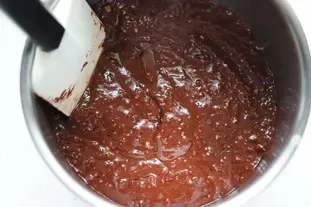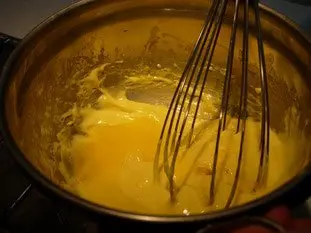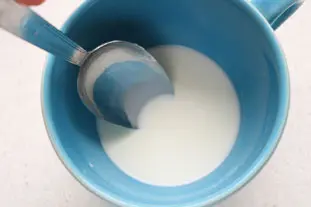The blog of cooking-ez.com
The dissociation of a preparation

It may have already happened to you: You prepare a sauce, a cream, a ganache etc. and then suddenly or almost, the whole thing dissociates, and from a smooth mixture that you were preparing with love, you end up with a horrible thing with a more or less solid part and another liquid part.
It's the dissociation, or as the french pastry chefs and cooks say, "it's tranché!".
It's the dissociation, or as the french pastry chefs and cooks say, "it's tranché!".
7,369 13 4.9
Last modified on: January 22th 2022
Keywords for this post:CreamSauceProblemDissociationSolidLiquidThe dissociation of a preparation
For example, here is a chocolate-hazelnut ganache that is tranché:
It doesn't show up very well in the (small) photo, but there's a thick chocolate-hazelnut pan base, and on top a layer of liquid fat.
In the vast majority of cases, it's because in your mixture there is a fatty part and a watery part, the whole thing comes together in a delicate balance.
If this balance is broken because there is too much of one or the other, or a thermal shock, the whole which was homogeneous dissociates, it cuts!
This imbalance is often caused by the heating, perhaps excessive, of the preparation, and during this heating the water can evaporate and reduce, the fat not.
This is what happened with the ganache above, I didn't remove the simmering cream from the heat soon enough before adding the chocolate and hazelnut powder, sad result.
Another example, a bearnaise sauce or a hollandaise sauce that slices when it was almost finished, it's certainly because there was too much butter added and not enough water in the vinegar-wine-herb or lemon reduction.
And besides, it doesn't prevent this tragedy, there is little or no warning of disaster for an amateur, it is quite brutal.
1) Don't panic, don't despair, because it's very easy in this situation, so great is the disappointment, to swear a good big blow, to say to oneself that it's ruined, and to throw everything away...
2) Keep a critical eye: OK it's tranché, but what if it lacks water? Let's try to compensate it, and for that :
- Remove immediately from the heat or the water bath
- Add, very cold, a little bit of water (Béarnaise) or one of the components that brings it (cream for the ganache).
- Take the mixture back slowly, with a whisk, a spatula or a maryse to incorporate this addition (cross your fingers too, put all the chances on your side ;-).
3) If it still doesn't work, use the super power of cornstarch:
- Incorporate a mixture made of a tablespoon of water and a teaspoon of cornstarch in the preparation that you will put back on the fire and will whip until return of the initial texture.
You will have understood, there is no fatality in these small culinary dramas, it is just a bit of physics in your pan, it is necessary to try to be attentive enough during your preparation, to prevent rather than to cure.
To sum up: A preparation that goes off is most of the time an imbalance of water/fat, an imbalance that you can try to reduce or eliminate to regain the initial smoothness.

It doesn't show up very well in the (small) photo, but there's a thick chocolate-hazelnut pan base, and on top a layer of liquid fat.
What happened?
In the vast majority of cases, it's because in your mixture there is a fatty part and a watery part, the whole thing comes together in a delicate balance.
If this balance is broken because there is too much of one or the other, or a thermal shock, the whole which was homogeneous dissociates, it cuts!
This imbalance is often caused by the heating, perhaps excessive, of the preparation, and during this heating the water can evaporate and reduce, the fat not.
This is what happened with the ganache above, I didn't remove the simmering cream from the heat soon enough before adding the chocolate and hazelnut powder, sad result.
Another example, a bearnaise sauce or a hollandaise sauce that slices when it was almost finished, it's certainly because there was too much butter added and not enough water in the vinegar-wine-herb or lemon reduction.
And besides, it doesn't prevent this tragedy, there is little or no warning of disaster for an amateur, it is quite brutal.
What to do if it does?
1) Don't panic, don't despair, because it's very easy in this situation, so great is the disappointment, to swear a good big blow, to say to oneself that it's ruined, and to throw everything away...
2) Keep a critical eye: OK it's tranché, but what if it lacks water? Let's try to compensate it, and for that :
- Remove immediately from the heat or the water bath
- Add, very cold, a little bit of water (Béarnaise) or one of the components that brings it (cream for the ganache).
- Take the mixture back slowly, with a whisk, a spatula or a maryse to incorporate this addition (cross your fingers too, put all the chances on your side ;-).

3) If it still doesn't work, use the super power of cornstarch:
- Incorporate a mixture made of a tablespoon of water and a teaspoon of cornstarch in the preparation that you will put back on the fire and will whip until return of the initial texture.

You will have understood, there is no fatality in these small culinary dramas, it is just a bit of physics in your pan, it is necessary to try to be attentive enough during your preparation, to prevent rather than to cure.
To sum up: A preparation that goes off is most of the time an imbalance of water/fat, an imbalance that you can try to reduce or eliminate to regain the initial smoothness.
Lasts posts
Wipe meats and fish before cooking
When you want to cook meat or fish, there's a very simple yet very important step to take before you even start: It's to dry, or wipe, each side of the meat or fish, sometimes called "dabbing" or "sponging". But why? And how? Let me explain.1,4965 April 14th 2024
Toss the salad
When you've finished preparing a salad, green or otherwise, it's usually time to add the dressing and toss. It's often said to "toss the salad", which means to season and mix. Is it easy? Not so easy...2,8335 March 8th 2024
Half milk, half cream
In a multitude of recipes, savoury or sweet, milk is used as the main ingredient, or at least as the main liquid ingredient. Milk is used instead of water, for example, because milk contains a proportion of fat, which adds roundness and softness to the recipe. This mellowness is very pleasant on...2,681 February 27th 2024
Cutting soft cheeses
As you may have already noticed, when you have to use a "soft" cheese in a recipe - their exact name is "soft cheese" - such as Camembert, Munster or Mont d'or, it's not easy to make anything other than thick slices.2,8015 February 20th 2024
It's spinning too fast!
When you need to grate or slice vegetables, you generally use an electric machine that does all the work: a food processor, a mixer with a "slicer" extension or similar. Are these machines really suitable? Generally speaking, yes of course, but there's one criterion that often poses a problem,...5,7655 November 12th 2023
Other pages you may also like
Candied fruits: don't get ripped off
Do you like candied fruit? You might like to nibble a handful or add it to a recipe, like a classic fruit cake or delicious Italian specialities like panettone or sicilian epiphany pie.53K 24.2 June 21th 2017
Different kinds of pastry and dough
When cooking in general, and particularly in baking, we can make and use many different kinds of pastry and dough. All built on the same "base": flour - a powder to which we add fat, liquid or both to produce the dough which is then cooked. .105K 14.0 November 6th 2012
The golden-brown finish on puff pastry
Let's take a look at the tricky matter of producing puff pastry with an attractive, golden-brown finish. French pastry chefs call this "dorure" (literally, "gilding"). Behind this quirky term there lurks a real problem (and the solution): when using puff pastry (pâte feuilletée) for a pie, or...40K 24.6 February 8th 2018
What happens to the bread when you make it?
This bread that we eat every day, and that our baker makes for us, what happens during its manufacture so that it becomes bread? I will try to answer this question, and to summarize the complex alchemy that takes place.8,7554.9 May 28th 2021
Butter doesn't make you fat, unless you eat too much of it.
Whenever I'm discussing cooking and recipes, there is one idea which comes up frequently, like this: "Oh no! But that's got butter in it" (I should add, for the sake of accuracy, that this is something I hear more frequently from women, who are almost all concerned with keeping their figure). ...38K4.5 March 26th 2012
Post your comment or question
Follow this page
If you are interested in this page, you can "follow" it, by entering your email address here. You will then receive a notification immediately each time the page is modified or a new comment is added. Please note that you will need to confirm this following.
Note: We'll never share your e-mail address with anyone else.
Alternatively: you can subscribe to the mailing list of cooling-ez.com , you will receive a e-mail for each new recipe published on the site.









